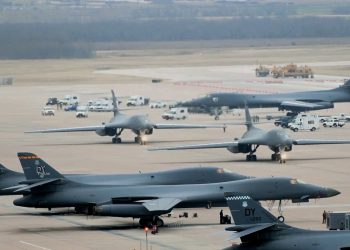,
WASHINGTON(Reuters): The US Air Force said on Thursday it picked a version of Boeing Co.'s CH-47 Chinook helicopter to replace its aging fleet of Sikorsky HH-60G Pave Hawk combat search-and-rescue helicopters.
Air Force Assistant Secretary for Acquisition Sue Payton said the Boeing helicopter offered the best value, based on its range, speed and cabin size, and loiter time.
The new helicopter offered a “vast improvement over what we have today,” she told reporters at the contract announcement.
The contract calls for 141 production aircraft and five test aircraft in a deal the Air Force valued at $15 billion through 2019. It awarded Boeing an initial contract of $712 million on Thursday for system development and demonstration.
Officials said it would cost an additional $20 billion to operate and maintain the helicopters over their 30-year life.
The new heavy-lift, high-altitude helicopters will have a range of 275 nautical miles, a speed of at least 135 knots, and the ability to loiter above a rescue site for five minutes.
“This aircraft here will get us places we cannot go in the 60, and we can get everybody out in one shot instead of going back multiple times,” said one official at Air Combat Command, which helped shape the requirements for the new helicopters.
The Air Force said the first 10 helicopters, to be known as the HH-47, are due to go into service in 2012. Boeing would deliver the first aircraft in 2011, officials said.
Boeing's tandem rotor CH-47 is widely used by the Army and U.S. special forces.
Boeing's helicopter beat out the US101 built by Lockheed Martin Corp. and AgustaWestland Inc., a unit of Italy's Finmeccanica SpA, and the VH-92 built by Sikorsky, a unit of United Technologies Corp.
Some experts had expected the US101 to win the contract since it was chosen last year as the U.S. presidential helicopter.
Payton said the Boeing aircraft could be delivered several months earlier than the competitors. Past performance was another big factor in evaluating the proposals — even more than cost, but she declined to say whether delays with Lockheed's US101 counted against that team's proposal.
Boeing is already producing the CH-47 for the other services, so the Air Force also saw less risk than buying an aircraft still in development, Payton said.
Maj. Gen. Wendell Griffin said Boeing would build an initial version of the helicopter, to be followed at some unspecified date by a another version that would include terrain avoidance systems and other equipment.
Boeing's pledge to move quickly to this second version also helped its proposal prevail, officials said.
“The CSAR award is a vote of confidence by the Air Force in the ability of Boeing to provide them the rotorcraft they need for this very important mission,” said Jim Albaugh, president and chief executive officer of Boeing's defense unit.
Boeing will build the helicopters at its manufacturing facility in Ridley Park, Pennsylvania, where it already builds the special operations MH-47 and Chinook helicopters.
Boeing said the helicopter's capabilities were widely demonstrated in current conflicts and various U.S. and international humanitarian relief operations.









